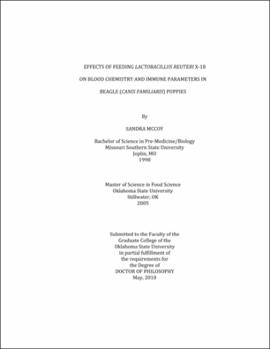| dc.contributor.advisor | Gilliland, Stanley E. | |
| dc.contributor.advisor | McGlynn, William | |
| dc.contributor.author | McCoy, Sandra | |
| dc.date.accessioned | 2013-11-26T08:22:36Z | |
| dc.date.available | 2013-11-26T08:22:36Z | |
| dc.date.issued | 2010-05 | |
| dc.identifier.uri | https://hdl.handle.net/11244/6607 | |
| dc.description.abstract | Scope and Method of Study: The main objective of the present study was to see the effects of feeding L. reuteri on various immune parameters in two-month old beagle puppies. Twenty beagle puppies were assigned to one of two treatments. Ten puppies received the probiotic L. reuteri X-18 in ~5-10 mL of 10% nonfat dry milk (1.0 x 109 CFU each) while the control group received only 10% nonfat dry milk. Treatments were fed twice daily in addition to dry dog food for eight weeks. At the end of each week, blood and fecal samples were collected as well as body weights to adjust dry food rations for performance measures. Serum and fecal immunoglobulin (IgA, IgE, IgM and IgG) levels, complete blood counts, and biochemistry panels were monitored on a weekly basis over the period of two months. | |
| dc.description.abstract | Findings and Conclusions: Overall, no significant differences could be seen between the control and treatment groups with respect to immunoglobulins. For the CBC, the least square means of both the control and treatment groups were within the reference range with only two parameters (eosinophils and platelets) being slightly elevated. Those elevated values could be due to variations as a result of the testing profiles that were used to determine the reference ranges (sex, breed, and age). Based on these results, the animals were still considered healthy with no extreme effects seen. For the biochemistry panel, only GGT and creatinine showed a significant treatment x week effect. The least square means of both the control and treatment groups were within the reference range, which are consistent with the healthy status of the dogs. Consumption of the probiotic was not associated with any significant changes in the clinical status as determined by the use of a standard physical examination, CBC, biochemical profiles, and immunoglobulin concentrations. The lack of differences could be considered advantageous, as there were no adverse side effects observed due to the consumption of the probiotic. | |
| dc.format | application/pdf | |
| dc.language | en_US | |
| dc.rights | Copyright is held by the author who has granted the Oklahoma State University Library the non-exclusive right to share this material in its institutional repository. Contact Digital Library Services at lib-dls@okstate.edu or 405-744-9161 for the permission policy on the use, reproduction or distribution of this material. | |
| dc.title | Effects of feeding Lactobacillus reuteri X-18 on blood chemistry and immune parameters in beagle (Canis familiaris) puppies | |
| dc.contributor.committeeMember | Mireles-DeWitt, Christina | |
| dc.contributor.committeeMember | DeSilva, Udaya | |
| dc.contributor.committeeMember | Fathepure, Babu | |
| osu.filename | McCoy_okstate_0664D_10765.pdf | |
| osu.accesstype | Open Access | |
| dc.type.genre | Dissertation | |
| dc.type.material | Text | |
| dc.subject.keywords | beagles | |
| dc.subject.keywords | blood | |
| dc.subject.keywords | dogs | |
| dc.subject.keywords | immunoglobulins | |
| dc.subject.keywords | lactobacillus | |
| dc.subject.keywords | probiotics | |
| thesis.degree.discipline | Food Science | |
| thesis.degree.grantor | Oklahoma State University | |
